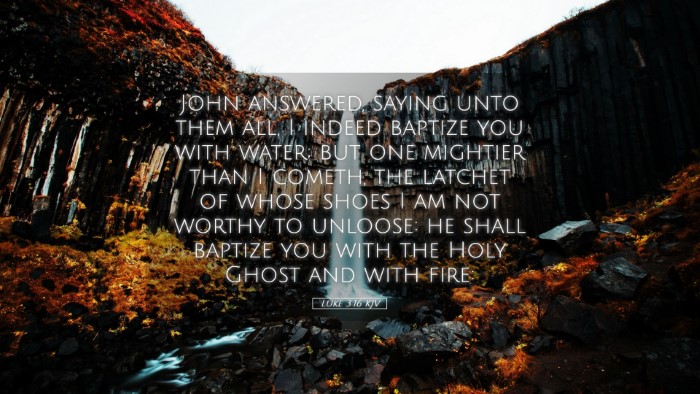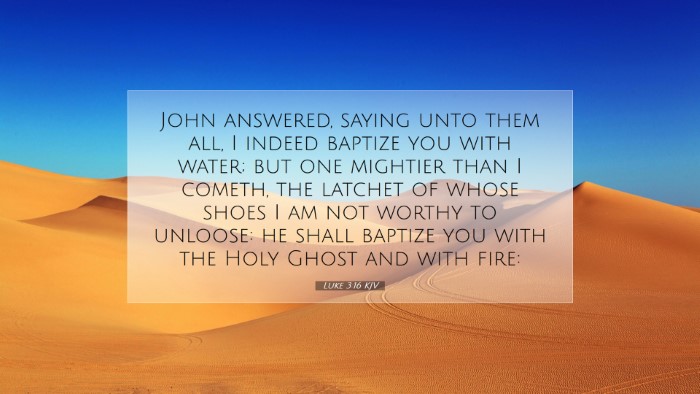Commentary on Luke 3:16
Verse Analysis: Luke 3:16 states, "John answered them all, saying, 'I baptize you with water, but he who is mightier than I is coming, the strap of whose sandals I am not worthy to untie; he will baptize you with the Holy Spirit and fire.'"
Contextual Overview
In this verse, we find John the Baptist responding to inquiries about his identity and ministry. The emphasis lies on the contrast between John's baptism and the forthcoming ministry of Jesus Christ. John acknowledges the greatness of the one who is to come, highlighting the transformative nature of the coming Savior's work.
Commentary Insights
Matthew Henry's Commentary
Matthew Henry notes that John the Baptist was a prophet who prepared the way for Christ. His baptism was a symbolic act of repentance, yet it was limited in power. Henry emphasizes that John's modesty is evident in his expression of unworthiness, indicating that he recognizes his role as preparatory while pointing to Christ as the source of spiritual renewal.
- The Role of Jesus: John refers to Jesus as "mightier" which is crucial to understanding His divine authority. This superiority refers both to His power and the nature of the baptism He brings.
Albert Barnes' Notes on the New Testament
Barnes elaborates on the significance of 'baptizing with the Holy Spirit and fire.' He explains that this indicates a more profound transformation than mere ritual cleansing. The Holy Spirit signifies empowerment for ministry and the fire symbolizes judgment and purification.
- The Meaning of Baptism: The baptism with the Holy Spirit indicates initiation into a new covenant, empowering believers for the task at hand. The imagery of fire speaks to the purification process that believers undergo as they are transformed into the likeness of Christ.
Adam Clarke's Commentary
Clarke dives deeper into the cultural implications of 'the strap of whose sandals I am not worthy to untie.' In first-century Jewish culture, this act was reserved for the lowest servants. This humility stresses John's understanding of his position before Christ, which is a significant point for spiritual leaders to grasp today.
- Importance of Humility: Clarke urges leaders to remember their place in relation to Christ; that true leadership involves recognizing one's limitations and submitting fully to the greater authority of Jesus.
Theological Implications
The mention of both the Holy Spirit and fire has profound theological implications. It emphasizes the holistic nature of salvation that extends beyond mere external acts to encompass internal transformation. The work of the Holy Spirit signifies God’s active presence within believers, while fire represents judgment—is there ongoing reformation in the life of believers as evidenced by their works?
Applications for Believers
This verse invites reflection on the nature of our own baptisms and what it means to be filled with the Holy Spirit.
- Romans 8:9-11: Paul underscores the importance of having the Spirit of Christ within, which parallels John's expectations of the One to come.
- Call to Service: In recognizing our unworthiness, we are reminded to serve others without seeking recognition, much like John the Baptist.
Conclusion
Luke 3:16 serves as a poignant reminder of who Jesus is and what He accomplishes through the Holy Spirit. For pastors, students, theologians, and scholars, this passage challenges us to examine our spiritual birth and the active work of the Holy Spirit in our lives as agents of change and transformation in the world.


